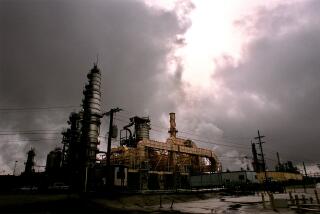OPEC Will Fail to Reach Agreement on Oil Pricing, Herrington Predicts
- Share via
VIENNA — There is a strong likelihood that OPEC will fail to reach agreement on a plan to fix oil prices and production at its year-end meeting here, U.S. Energy Secretary John S. Herrington said Friday.
Claiming to have “good sources at the meeting,” Herrington, speaking by phone from Palm Springs, attributed the cartel’s difficulty in reaching an agreement to “intransigent” behavior by Iran similar to its conduct in negotiations toward a cease-fire in its war with Iraq.
A failure by the Organization for Petroleum Exporting Countries to reach any accord would cause downward pressure on prices, but not a collapse, according to Herrington.
On the New York Mercantile Exchange on Friday, the January-delivery price of West Texas Intermediate crude oil fell 20 cents to close at $18.31 a barrel.
Oil ministers twice canceled two meetings of the full membership as leading figures in the cartel met privately into the night to break an impasse on the third day of their meeting. Several officials said there had been “good progress,” but few reliable details were available.
Up to 12 of the 13 nations are in support of maintaining the current official price of $18 a barrel. Iran was still pushing for an increase of at least $2 a barrel and fighting a widely supported move to give its war foe, Iraq, a quota equal to the Iranians.
“It’s going to be very difficult for them to come to an agreement,” Herrington said. “Iran isn’t going to go for” the higher Iraqi quota “and the countries which support that position are very solid.
“There will either be an agreement without Iran or no agreement at all,” the energy secretary predicted.
He also offered his opinion that Iran’s threat to flood the world oil markets by doubling its production if it doesn’t win a price increase is an empty one.
“My opinion is that Iran is maxed out on their production,” he said. That is a view shared by many, but not all, experts on Middle Eastern oil fields and shipping facilities.
In commenting on the progress of a meeting in which the United States isn’t involved, Herrington appeared to be trying to draw attention to Iran’s recent international behavior and win broader support for the U.S. boycott on importing Iran’s oil.
Herrington referred to comments this week by United Nations Secretary General Javier Perez de Cuellar that he has been unable to negotiate with Iran on the cease-fire plans for the Iran-Iraq war.
“It looks to me as if Iran is being very, very difficult here. What you’re seeing in the OPEC meeting is what he is seeing in the cease-fire talks. They are being intransigent.”
Herrington said the Western world has “strengthened Iran’s hand somehow by not showing more support for the embargo.” And he voiced fear that recent conciliatory gestures by the French toward Iran might signal an erosion of France’s boycott against Iranian crude oil.
France and the United States are the only nations to boycott oil from Iran. Oil experts say that without similar actions by other countries, especially Japan, the two boycotts would merely cause a shift in world oil buying patterns with no serious penalty to Iran.
However, Iran’s difficulty in selling some crude originally earmarked for the United States has caused it to offer steep discounts on the oil, most oil analysts say. That has weakened prices on world markets, undermining Iran’s campaign here to raise prices.
Iran has denied discounting the price, and blamed Saudi Arabia and Kuwait for attempting to isolate Iran within OPEC for political reasons.
More to Read
Inside the business of entertainment
The Wide Shot brings you news, analysis and insights on everything from streaming wars to production — and what it all means for the future.
You may occasionally receive promotional content from the Los Angeles Times.










